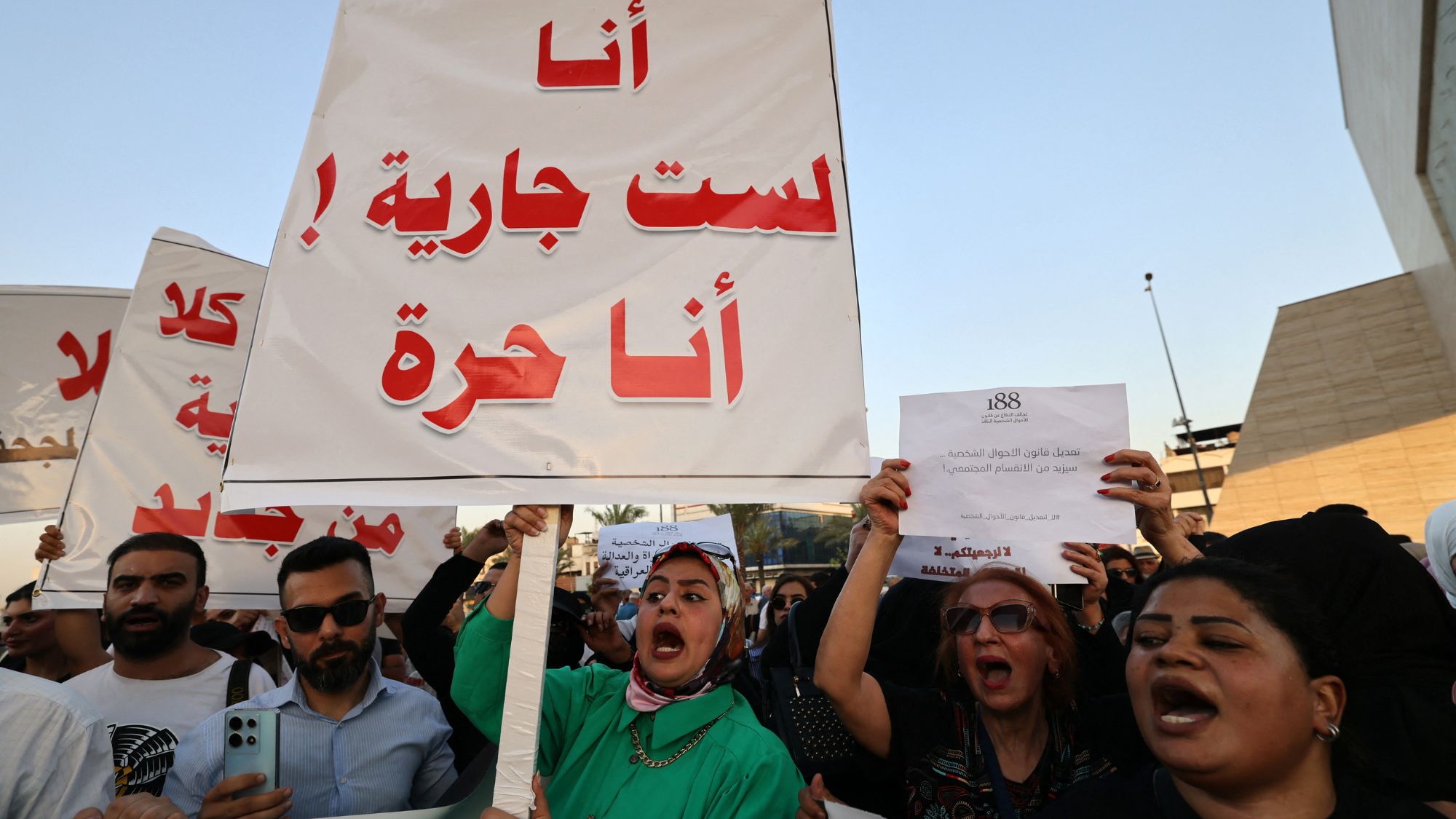The Iraqi bill to lower the age of marriage for girls to nine
Politicians and activists are protesting the conservative bill, which would give religious leaders more power over personal affairs

A free daily email with the biggest news stories of the day – and the best features from TheWeek.com
You are now subscribed
Your newsletter sign-up was successful
A proposed amendment to Iraq's family legislation could "hand more power in family matters to clerics" and, alarmingly, "open the door for marriage to be legalised for children as young as nine years old".
Women's rights advocates and their political allies fiercely oppose the proposal, said Middle East Eye. It is backed by Coordination Framework – a coalition made up of conservative, Shia religious factions that have "dominated" Iraqi politics since 2021, said The Guardian.
What is the current law?
This is the latest of many attempts to alter the Personal Status Law of 1959, also known as Law No. 188.
The Week
Escape your echo chamber. Get the facts behind the news, plus analysis from multiple perspectives.

Sign up for The Week's Free Newsletters
From our morning news briefing to a weekly Good News Newsletter, get the best of The Week delivered directly to your inbox.
From our morning news briefing to a weekly Good News Newsletter, get the best of The Week delivered directly to your inbox.
The law, when it was passed 65 years ago, established 18 as the legal age of marriage – though children can be married as young as 15 with permission from a judge or guardian. Unicef reports that 28% of Iraqi girls are married before 18, thousands of them in unauthorised religious ceremonies.
"Several attempts to abrogate the law and revert to traditional Islamic rules have been made since the 2003 US-led invasion that toppled dictator Saddam Hussein," said France 24.
What would change?
The most recent amendment, which threatens to undermine the law's secular nature, was introduced on 4 August. While the bill doesn't explicitly legalise child marriage, it would mandate Muslim couples to select either the Sunni or Shia sect at the time of the registration of their marriage. They then have the choice to have that sect "represent them in 'all matters of personal status' rather than the civil judiciary", said Middle East Eye.
Opponents say this paves the way for the children of these marriages to be married off by their parents according to the doctrine of their sect, potentially bypassing the secular mandatory minimum age.
A free daily email with the biggest news stories of the day – and the best features from TheWeek.com
After youth protests erupted across Iraq in 2019, politicians "saw that the role of women had begun to strengthen in society", Nadia Mahmood, co-founder of the Aman Women's Alliance, told The Guardian. “They felt that feminist, gender and women’s organisations, plus civil society and activist movements, posed a threat to their power and status."
What has the reaction been?
Around 500 women's rights advocates protested the amendment in Baghdad's Tahrir Square on 8 August, and demonstrations have followed in several other Iraqi cities.
Members of Coalition 188, an activist group that led the demonstrations, held signs reading "No marriage of minors" and "There is no Quranic verse that takes custody away from the mother", according to Middle East Eye. Inas Jabbar, who is part of Coalition 188 and sits on the board of the Iraqi Women Network, told the publication that protesters in the Najaf province "were beaten by hardline groups that agree with the amendments".
The independent MP behind the bill, Ra'ad al-Maliki, has denied that it would allow child marriage, describing claims to the contrary as "lies fabricated by some out of hatred for applying the provisions of God’s law to those who want them".
Razaw Salihy, Amnesty International's Iraq researcher, said that the changes should be "stopped in their tracks" immediately. "No matter how it is dressed up, in passing these amendments, Iraq would be closing a ring of fire around women and children," he said.
-
 What is the endgame in the DHS shutdown?
What is the endgame in the DHS shutdown?Today’s Big Question Democrats want to rein in ICE’s immigration crackdown
-
 ‘Poor time management isn’t just an inconvenience’
‘Poor time management isn’t just an inconvenience’Instant Opinion Opinion, comment and editorials of the day
-
 Bad Bunny’s Super Bowl: A win for unity
Bad Bunny’s Super Bowl: A win for unityFeature The global superstar's halftime show was a celebration for everyone to enjoy
-
 ‘Poor time management isn’t just an inconvenience’
‘Poor time management isn’t just an inconvenience’Instant Opinion Opinion, comment and editorials of the day
-
 ‘The forces he united still shape the Democratic Party’
‘The forces he united still shape the Democratic Party’Instant Opinion Opinion, comment and editorials of the day
-
 How are Democrats trying to reform ICE?
How are Democrats trying to reform ICE?Today’s Big Question Democratic leadership has put forth several demands for the agency
-
 Big-time money squabbles: the conflict over California’s proposed billionaire tax
Big-time money squabbles: the conflict over California’s proposed billionaire taxTalking Points Californians worth more than $1.1 billion would pay a one-time 5% tax
-
 Trump links funding to name on Penn Station
Trump links funding to name on Penn StationSpeed Read Trump “can restart the funding with a snap of his fingers,” a Schumer insider said
-
 Trump reclassifies 50,000 federal jobs to ease firings
Trump reclassifies 50,000 federal jobs to ease firingsSpeed Read The rule strips longstanding job protections from federal workers
-
 Supreme Court upholds California gerrymander
Supreme Court upholds California gerrymanderSpeed Read The emergency docket order had no dissents from the court
-
 Trump demands $1B from Harvard, deepening feud
Trump demands $1B from Harvard, deepening feudSpeed Read Trump has continually gone after the university during his second term